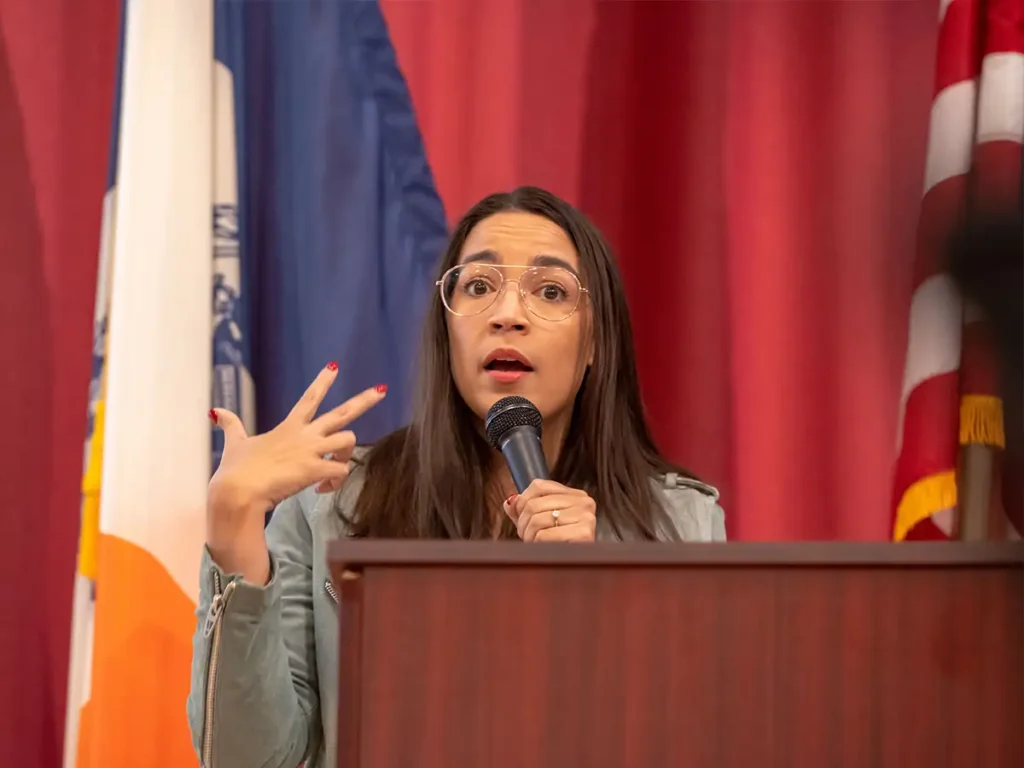Alexandria Ocasio-Cortez Throws Support Behind Biden’s Reelection

In a notable display of Democratic cohesion, Representative Alexandria Ocasio-Cortez from New York has endorsed President Joe Biden’s bid for reelection, signaling a strong message of unity among Democrats.
During a recent appearance on the “Pod Save America” podcast, Ocasio-Cortez openly expressed her backing for Biden’s reelection campaign, citing the current roster of contenders in the primary race as a crucial factor in her decision. Notably, Marianne Williamson, an author, and Robert F. Kennedy Jr., an anti-vaccine activist, have both entered the 2024 Democratic presidential race.
In the past, Ocasio-Cortez has demonstrated a willingness to challenge Biden and other party leaders when necessary. She notably voted against the deal Biden negotiated with Republicans to raise the nation’s debt ceiling and stood as the sole Democratic vote opposing a spending bill aimed at averting a partial government shutdown.
Her endorsement of Senator Bernie Sanders during the 2020 Democratic presidential primary highlighted her progressive stance. However, Ocasio-Cortez has now thrown her support behind Biden for the upcoming election, emphasizing her belief in his achievements despite some areas of concern.
President Biden, facing only nominal primary challenges, has earned Ocasio-Cortez’s endorsement, with the Congresswoman praising his early accomplishments. Among these were the successful passage of the American Rescue Plan, providing crucial pandemic relief, and the Inflation Reduction Act, a significant piece of legislation addressing climate and healthcare concerns.
Despite endorsing Biden, Ocasio-Cortez has not refrained from offering constructive criticism. She acknowledged that while the President’s first term has seen commendable progress, there are still areas that warrant improvement.
However, some critics argue that her endorsement came prematurely and may have missed an opportunity to leverage her support for Biden. They contend that Ocasio-Cortez could have used her backing as a bargaining chip to extract firmer commitments from the President on critical policy positions.
For instance, delaying her endorsement until later in the primary process might have given her more leverage to demand clarity on contentious issues such as immigration, Medicare-for-all, Ukraine-Russia relations, trans rights in schools, labor support, and the filibuster.
By endorsing Biden early on, Ocasio-Cortez and other influential progressive figures like Bernie Sanders risk weakening their ability to advocate for bolder policy positions within the Democratic Party. Aligning themselves with the establishment this early in the race may lessen the left wing’s potential impact on shaping the party’s agenda and pursuing progressive goals.
In conclusion, Ocasio-Cortez’s endorsement of Biden’s reelection bid demonstrates Democratic solidarity. However, it has also sparked debate about the timing and strategic implications of such support. The forthcoming primaries will offer more insight into the party’s direction, and there is still ample time for candidates to challenge Biden’s policies and proposals.
Ultimately, the role of progressive figures like Ocasio-Cortez and Sanders will be pivotal in shaping the Democratic platform. Their endorsements can carry significant weight, making it essential for them to use their backing strategically to further their vision for the future of the party and the nation. As the political landscape evolves, their influence could determine the Democratic Party’s direction in both the primaries and the general election.







Have your say